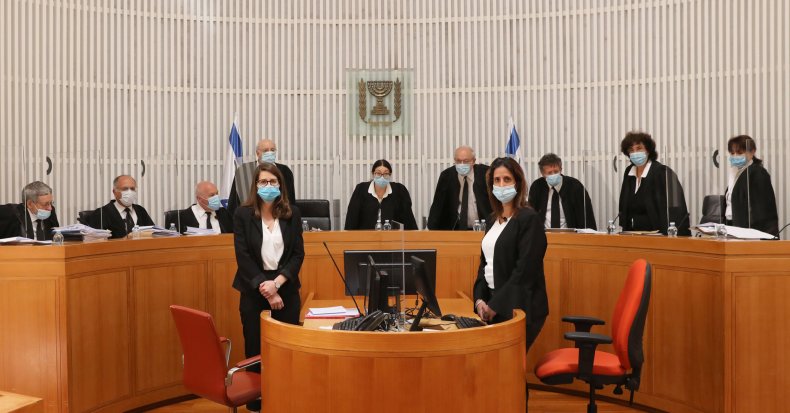by Avi Bell
Hat tip: Jenny Grigg
[S]ome 40 years ago, Israel's high court embarked on a program to gradually supplant parliamentary authority and make Israel's legal authorities the most powerful in the democratic world.
Yariv Levin, justice minister of Israel's newly elected government, has proposed a judicial reform package that will return to Israel the separation of powers that characterized its earliest years. But even before the outlines of the plan were announced, the reform elicited fretting from political opponents and foreign critics who claimed it will sound the death knell for Israel's vibrant democracy.
These cries are alarmist, hyperbolic, and simply lacking in historical context.
The new government's judicial reform proposal has three key elements. The most important would give the Israeli Supreme Court explicit statutory authorization to overturn legislation, while also preserving the Knesset's authority to legislate. A second element would slightly modify Israel's existing process for appointing judges by a committee of public officials and sitting judges by adding more elected representatives to the committee. The third would reduce the ability of the Supreme Court to overrule elected officials' decision on the grounds of the Court's mere policy preferences.
The reform proposal has been a long time in the making. Israel has followed the British legal model since its founding—including parliamentary supremacy and the absence of a singular written constitution. In its early years, Israel's Supreme Court was seen as liberal and activist, fashioning legal tools inherited from the British Mandate to protect basic rights and freedoms.
But some 40 years ago, Israel's high court embarked on a program to gradually supplant parliamentary authority and make Israel's legal authorities the most powerful in the democratic world.
Sometimes populist, sometimes progressive, and always self-aggrandizing, Israel's Supreme Court has become uniquely juristocratic—unbound by any clear rules, and possessing power unprecedented in any other modern democracy.
The turning point in the Court's overreach came in the 1990s, when it declared a "constitutional revolution," giving itself unprincipled and unrestrained power to overturn parliamentary legislation. It was an unprecedented move for any Western democracy.
At first, the Court justified its power grab on the grounds that Israel's Basic Laws—laws earmarked for inclusion in a possible future written constitution—had themselves become a quasi-constitution, permitting the Court to invoke constitutional authority to strike down ordinary Knesset-passed legislation. But over time, the Court placed itself above the Basic Laws too—not only by rewriting them, but also by declaring itself the final arbiter of whether they are valid in the first instance. In recent years, the Court has dismissed the Basic Laws framework altogether, announcing that it can strike down Basic Laws and other legislation for any reason it wants, such as finding the laws "too political" or "insufficiently deliberated."
Armed with unbridled authority, today's Israeli Supreme Court habitually implements its policy preferences over those of Israel's legislators on foreign policy matters, military decisions, budgetary priorities, taxes, welfare benefits, radio and television programming, and every other notable governmental decision. This includes the power to hire and fire speakers of parliament, government ministers, army generals, and city mayors. The Supreme Court is currently deliberating whether to fire the new government's treasury minister on the grounds that a "reasonable" government would have appointed someone else.
 |
Perhaps most astoundingly, the Supreme Court posits itself as the final word on policy decisions, rather than deferring to the Israeli public or its elected representatives. The Court has deputized the attorney general and junior legal officers in this activism, giving them too the power to veto elected officials' policies to which they object.
As such, "legal" clearance of government decisions has functionally become an ideological, rather than legal, review by legal advisors.
The Supreme Court was once Israel's most trusted institution. But today, with the judiciary having cast off legal restraints, a majority of the public no longer trusts it. Recent polls show even more alarming disapproval of the rest of the deputized judicial system: Only single-digit percentages of the Israeli public voice confidence in the attorney general, government lawyers, and the police.
Unsurprisingly, calls for legal reform have been a facet of Israeli society since the "constitutional revolution" of the 1990s.
In 1994, Israel borrowed a constitutional technique from Canada, adding an "override clause" to one of its own Basic Laws. That clause permitted the Supreme Court to use that Basic Law to overturn legislation, while allowing the Knesset to restore the legislation to force by the vote of a majority of its members. Levin's proposal is for a more general override clause, implementing a judicial reform that has been proposed for decades. His proposed clause would ratify some of the Court's seized powers, while also reining in its gross overreach.
Contrary to the democracy doomsdayers, these measures would actually bring Israel closer in governance to other democracies, such as Canada and the United States. Ironically, they would also restore Israel's democratic practices from before the 1990s-era "constitutional revolution."
Until the most recent elections, calls for judicial reform came from all parts of the Israeli political spectrum. But with the reforms expected to be implemented under a right-wing government, partisan opponents now excoriate the very reforms they once supported as the purported downfall of Israeli democracy.
In reality, Israel's radically democratic political culture is healthy and vibrant. Judicial reform will ensure it remains so.
Avi Bell is a professor of law at the University of San Diego and Bar Ilan
University, and founding dean of the Israel Law and Liberty Forum's
annual program on law and democracy.
Source: https://www.newsweek.com/israels-judicial-reform-will-strengthen-its-democracy-opinion-1772077
No comments:
Post a Comment